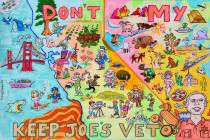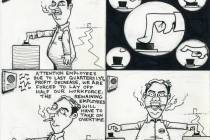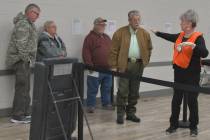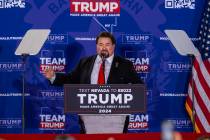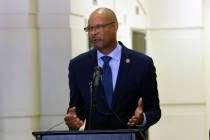Legislating words with preferred meaning
Language is power and those who control the language we use have more of it.
Officials of the administration of Florida Gov. Rick Scott were recently accused of telling state staffers not to use the terms “climate change” or “global warming,” allegedly to avoid problems for Scott, who cannot seem to reach a position on climate change.
Something similar in language manipulation was reported in Wisconsin.
As a result, Governing magazine has reported that Republicans around the country may seize on the tactic to avoid dealing with the issue. “It could lead to a bevy of Republican lawmakers enacting similar policies in other states” to reduce discussion of climate change, the magazine said.
I’ve noted before in this space the fact that Nevada prison guards are not called prison guards. Rather, they are called corrections officers. Robert Gagnier, former director of the State of Nevada Employees Association, saw that change happen decades ago. “It was a way of trying to elevate them, trying to make them more professional,” he told me.
But there was also a downside to it, as well. The newer term sounds like an office worker, and particularly like someone who processes parole applications. And it does not at all communicate the risks and danger involved in the job.
At one of my first legislatures, in the 1970s, a measure was introduced to change the name of the crime of rape to “sexual assault.” It was easy to understand the intention, to reduce the stigma experienced by victims. But it also reduced the stigma for offenders, as well. The term “sexual assault” fails to communicate the brutality and viciousness of the crime as effectively.
At the current Nevada Legislature, there is Senate Bill 188, “changing the word ‘accident’ to ‘crash’ in reference to motor vehicles…”
The measure is sponsored by Sen. Mark Manendo.
According to reporter Samantha Stone, whose column brought this bill to my attention, the change reflects the preference of the National Highway Traffic Safety Administration and is endorsed by Sandy Heverly, head of a group called Stop DUI, Inc., who says “ ‘Accident’ is deeply offensive” and impedes recovery for victims.
When I looked up the Senate committee hearing on this bill (the bill has already passed the Senate), I found this little dialogue:
Senator Mo Denis: “Are you saying because the language is changing from ‘accident’ to ‘crash’ there is an implied fault with the word ‘crash’ and not with the word ‘accident’?”
Sen. Patricia Farley: “When we heard testimony, the definition around ‘crash’ was that it was avoidable and there was intent and malice. We do not want to pass a bill that will create legal problems for our constituents.”
Committee chair Scott Hammond: “If we are talking about who is at fault, we do that already. We use the term ‘accident’ and there is always the implication that someone caused the accident.”
Thus we find different views of the same words among just three people, which is probably a pretty good argument against putting the meaning of words up for a popular vote.
During my lifetime, I’ve been hit by cars while I was walking, biking, and in vehicles, and they involved both negligence and innocence. When I was a toddler, my mother and I were hit at the corner of Chestnut and Second streets in Reno in what the Nevada State Journal called “One of those Alphonse and Gaston incidents, in which each party waves the other on and then both proceed together…” I can’t imagine anything dumber than using a law to arbitrarily define all accidents in one way instead of letting police and courts sort out those subjective matters.
Stone wrote, “Who made NTHSA the arbiter of proper thought? Who gave DUI victims the right to universally apply language that soothes their anger and pain? … If public brainwashing could reduce traffic accidents – accidents! – Nevada would have the safest roads on the planet. How many public safety campaigns have we, the media, covered? How many words urging cautious driving have been written, broadcast, and posted on billboards?”
Well said.
Dennis Myers is an award winning journalist who has reported on Nevada’s capital, government and politics for several decades. He has also served as Nevada’s chief deputy secretary of state.







